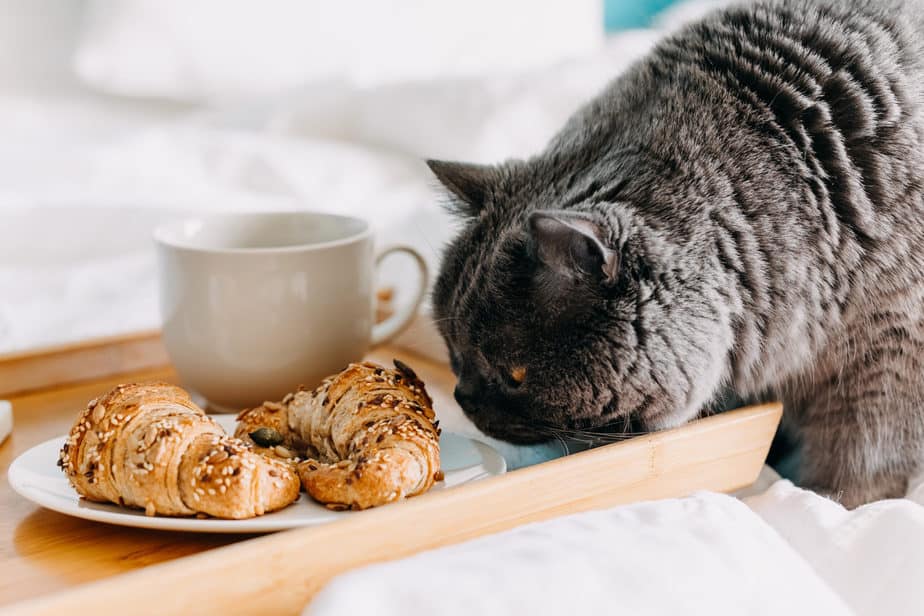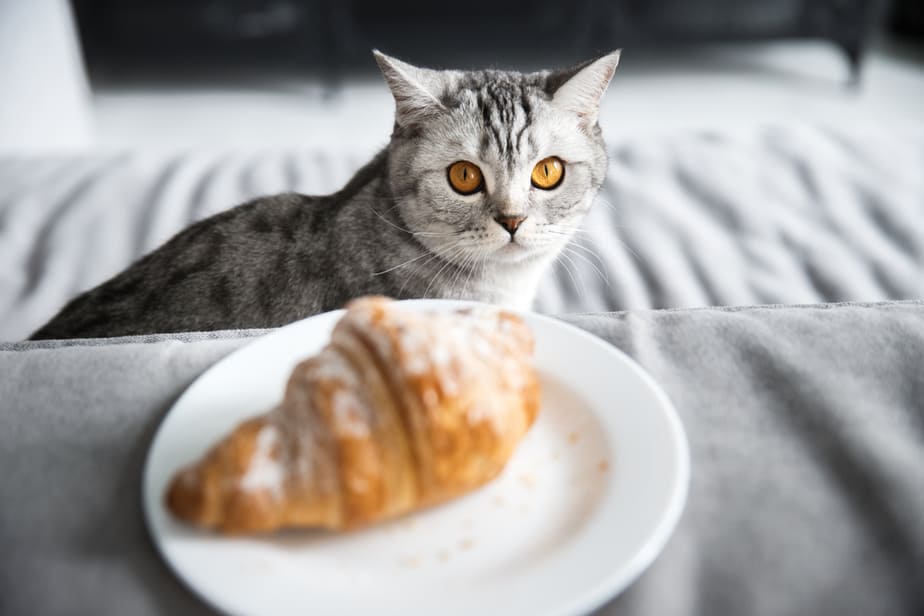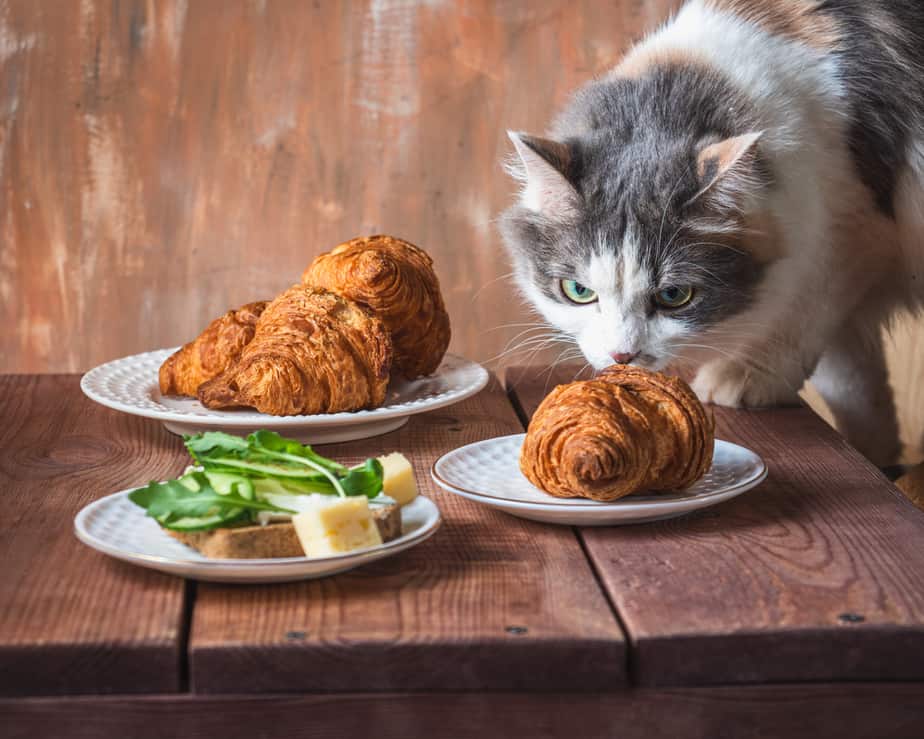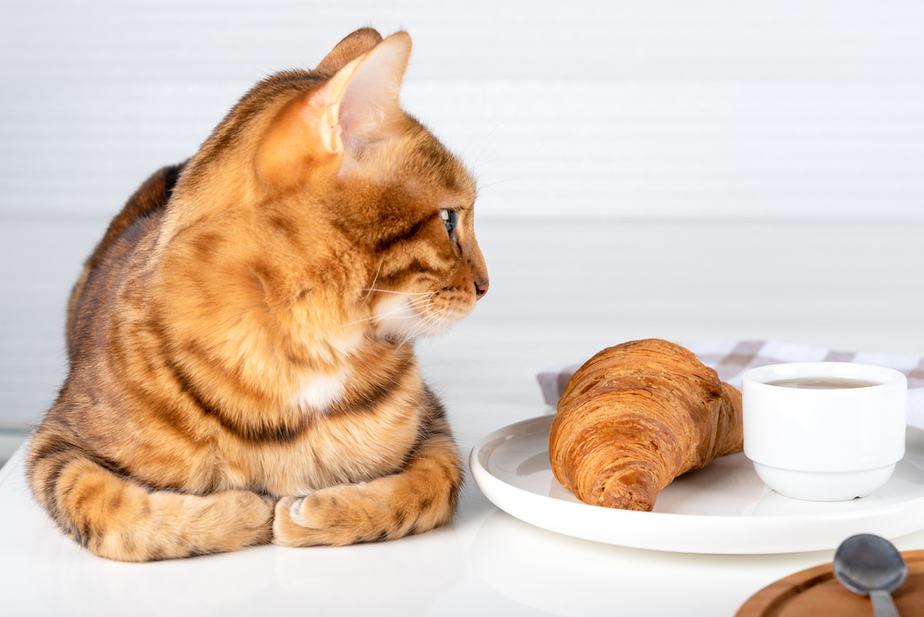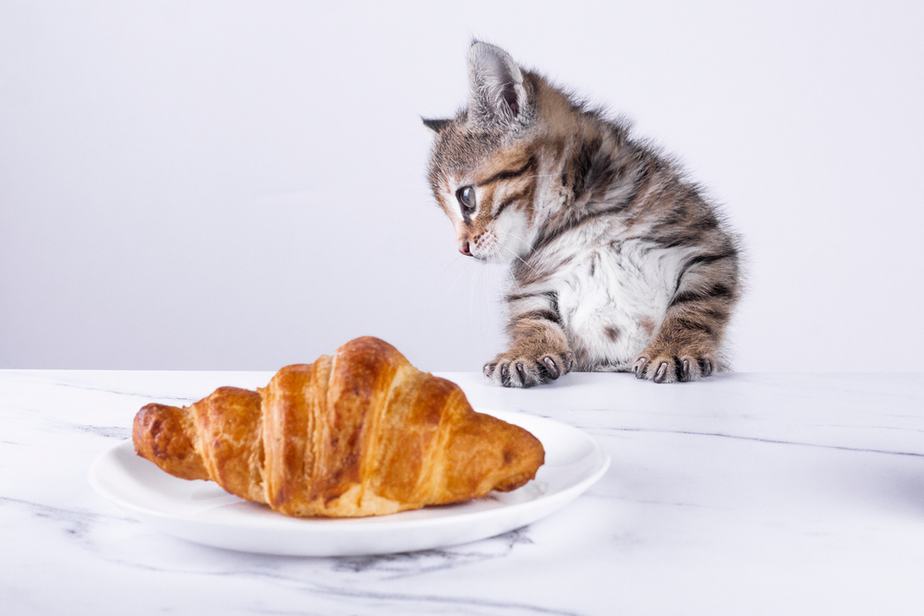📖 Table of Content:
Can cats eat croissants and should they even eat them? These baked goods are popular across the globe, and while they’re mostly associated with France, they’re actually of Austrian origin.
The pastry is recognized by its crescent shape and buttery taste. The flaky texture can cause hundreds of little crumbles to fall to the floor, and you’ll be too indulged to even notice. However, your cat surely won’t miss these fallen pieces.
She will be more than glad to clean up the mess off the floor for you. While doing so, you may start to panic a bit and wonder if cats can eat croissants? Let’s see what we can find out about these fluffy bread products.
Are croissants harmful to cats?
There are many types of croissants but all of them have the same foundation. This household staple serves as a quick breakfast or a life-saving snack when you’re in a hurry. Your hungry, greedy fluffball may have her eyes on a croissant, too.
This pastry isn’t toxic to cats if that’s what you’re wondering. Cats can eat croissants in small amounts without any consequences. Other than that, these treats should still mainly be used in human diets.
What are croissants made of?
This question usually doesn’t bother us when we see these buttery pastries. Their sweet scent and puffy texture are enough to make our mouths water. But, what is it that makes it so delicious to humans and potentially dangerous to cats?
Dough: leavened, raw
The dough isn’t usually harmful to felines, but it’s best to avoid feeding it to your kitten. Cats eating dough products like croissants or tortillas in small quantities isn’t a reason for concern. However, if she likes it too much, it’s best to stop the habit.
Croissants are made of leavened dough which carries some risks. If your feline ingests too much it could make her bloated. They simply don’t digest plant and grain material as well as meat. This means that dough, if not digested, could be stuck in her intestines.
Some cats required surgery to remove the dough from their intestines because they couldn’t do it on their own. Other than bloating, the dough can cause gas, diarrhea, and vomiting in felines.
When it comes to these potential risks, the same can be said about the raw dough. Make sure your four-legged friend doesn’t have access to the raw dough while you’re baking something.
What about butter?
Another item heavily used in croissants is butter. Butter, as you may know, is a dairy product and is therefore not advised for cats. It can give your cat the jitters and induce tummy pains.
Butter contains a lot of saturated fats and oils, which are a big no-no for cats since they can cause problems in their digestion. Besides, extra additives like salt make butter unfit for felines.
Small amounts of butter are unlikely to harm your cat, but keep your pet away from it. If your fur baby consumes too much of it, she will most likely experience some type of stomach distress.
Salt content in croissants
If you’re still asking yourself can cats eat croissants, let’s talk a bit about salt and the impact it has on felines. Salt contains sodium, which is an important mineral in both the human and feline bodies. Small amounts of this mineral are required to maintain your cat’s health.
However, too much salt can hurt your pet in the long run. If your cat consumes too much salt, she is very likely to experience sodium poisoning as one of the side effects..
Although this rarely occurs as a direct result of eating croissants, you should be aware of the signs and symptoms. Excessive thirst and urination, as well as vomiting, diarrhea, and lethargy, are all symptoms of salt poisoning.
Are there any health benefits of cats eating croissants?
Unfortunately for felines, croissants aren’t one of the most desirable foods out there. Bread products usually don’t contain nutrients that carnivores like cats require. If there’s no meat, the chances are your cat won’t even be attracted to the food.
However, pastries can entice cats’ senses because of the butter that provides supplements like fat and carbs.
What could possibly get your cat in a run-down condition?
As we previously mentioned, cats can eat croissants in small amounts, but that won’t benefit them in any way. Moreover, it could be detrimental to their health if eating croissants becomes a habit. Felines can’t process plant material as well as meat.
This means they won’t get all the benefits the products offer. As for the fat, it’s a necessary part of their diet and in the wild, as cats will eat the fattest parts of their catch first. This provides them with an energy source that keeps their bodies going and warms them up.
Still, can cats eat croissants because of saturated fats? The answer is no. Saturated fats aren’t the type of fat that will benefit your cat. These fats are unhealthy and can cause high levels of blood cholesterol.
This puts your fur kid at a higher risk of heart diseases and strokes. Not to mention the obesity that comes with the excess intake of fats. You probably know this well enough yourself.
Another nutrient that can have similar effects on your feline is carbs. Carbohydrates are needed on a daily level to fulfill your cat’s needs, but just as is the case with fat, an overabundance can be a reason for concern.
Croissants are calorie-dense which doesn’t make them a perfect treat for cats. Unnecessary amounts of calories can lead to increased fat storage. This will cause your cat to gain extra weight, which adds pressure to her joints.
Can cats eat croissants fillings and toppings?
Even though a plain, buttery croissant can satisfy our hunger, to make the experience even better, certain fillings and toppings are incorporated. Because why not?
The most famous fillings for these fluffy pastries are chocolate and vanilla. Chocolate makes up a great part of our diet when it comes to sweets. It serves as the main ingredient in chocolate cake or you can eat it straight from the wrapper.
Just like chocolate pudding, the filling in the croissants is creamy and you just can’t wait to bite down to the good part. However, chocolate is one of the ingredients that are highly poisonous to felines.
Chocolate fillings and toppings
Caffeine and theobromine are commonly found in these chocolate fillings and toppings. Because cats cannot digest these molecules as quickly as humans, they can be harmful to their health.
This can result in an accumulation of these components. As a result, several medical problems will emerge. Vomiting, diarrhea, and tiredness are all symptoms of chocolate toxicity.
Tremors and seizures, in addition to these modest symptoms, are some of the more serious indicators. Pay a visit to the vet if your cat gets a hold of chocolate, whether it’s milk or dark.
What about vanilla flavors?
Just as is the case with vanilla pudding, it’s best to stay away from these vanilla-flavored croissants. Vanilla extract is incredibly harmful to cats, and therefore, they can’t eat it. It includes ethyl alcohol, which can cause alcohol toxicity if consumed. That’s something you definitely don’t want happening to your fur friend.
If her naughty little paws couldn’t resist a lick of vanilla essence, keep an eye on her and look for signs of poisoning.
Sugar content
Humans have a strong sweet tooth, and naturally seek sugar as a source of quick energy, while cats don’t. It may appear to you she enjoys the sweet taste of croissants, but it’s nothing like it.
Cats are incapable of tasting sweetness. They lack the taste buds that would allow them to detect and enjoy the taste of sugar. This is a good thing because excessive amounts of sugar can lead to tooth decay and diabetes.
Ditch the human treats
Stock up on kitty goodies if your cat enjoys nibbling and is constantly bugging you as you eat.
There’s nothing wrong with giving your cat a treat from time to time. But stick with cat-appropriate ones. Cat snacks have been deliberately created to be excellent for them, and some even include benefits such as dental care.
If you’re more of a DIY person, homemade recipes for cat treats will be your thing. For example, you can dry some anchovies if your cat’s a fish-lover. If she’s more on the green side, opt for some fresh peppers or a fruit like mango.
To conclude: Can cats eat croissants?
To conclude whether cats can eat croissants, we have provided you with some of the main points regarding their content. That being said, croissants are best avoided, but if your cat nibbles on it, it shouldn’t be much of an issue.
However, watch out for the flavored croissants. This includes chocolate and vanilla fillings and toppings that are extremely dangerous to felines. Although chunky cats are cute, their health could be at a great risk.
If you don’t want your pet adding an extra few pounds, you should probably avoid croissants. Stick with her regular diet and don’t let the worries get to you!
Up next: Can Cats Eat Waffles? A Threat To Your Cat’s Health?
